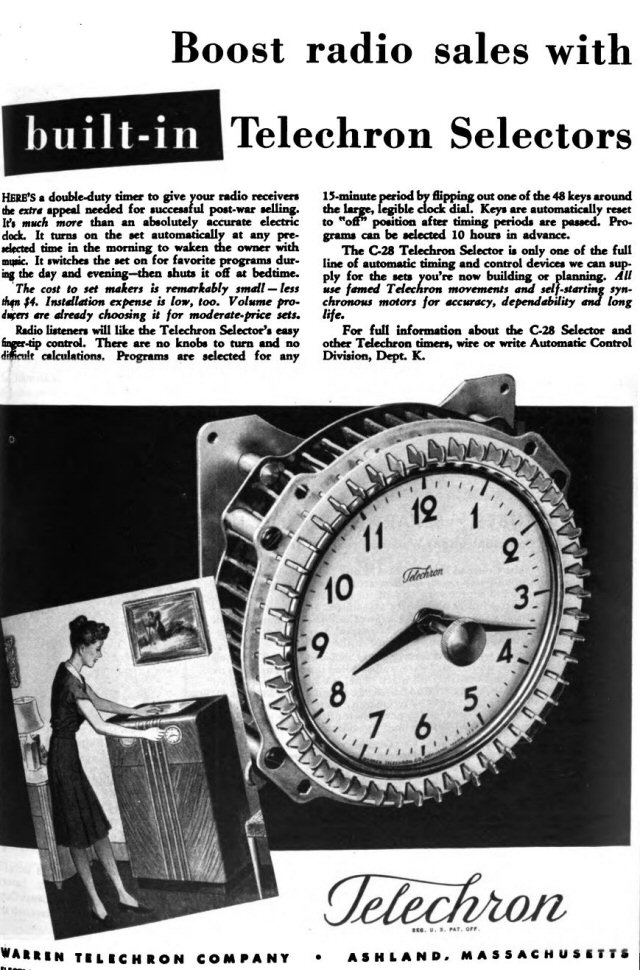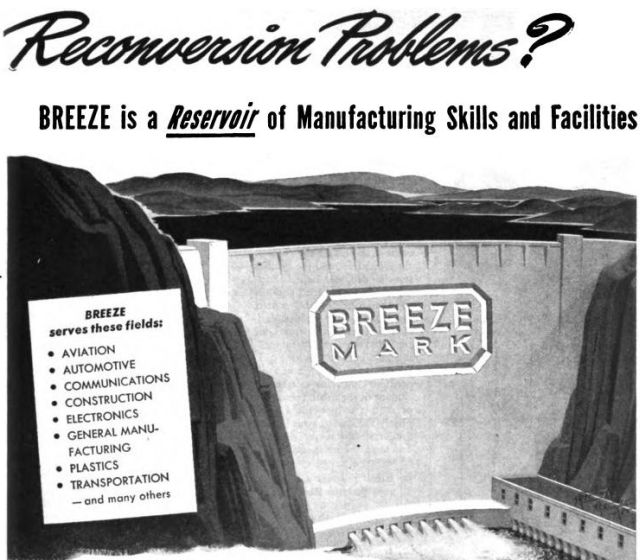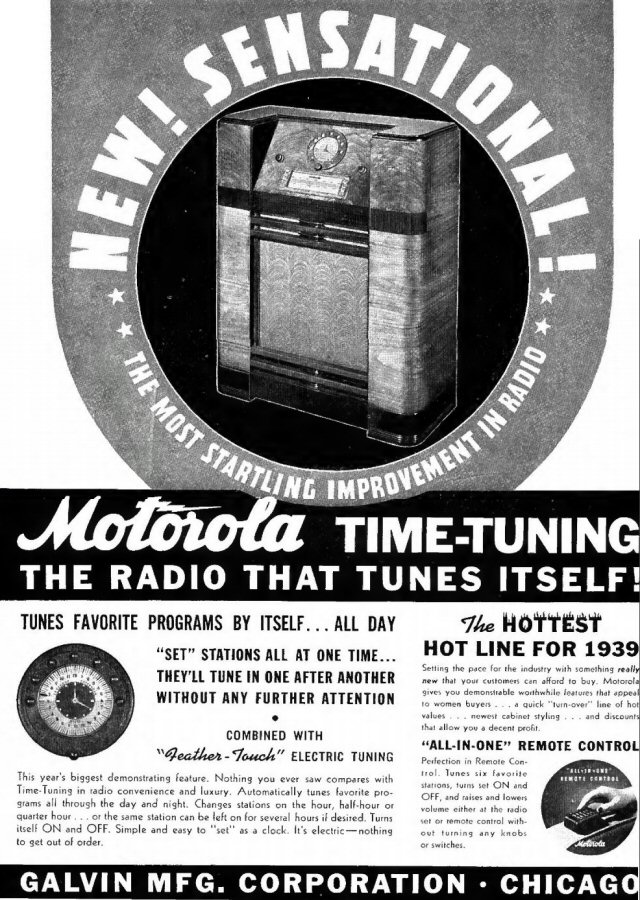Sunday, June 19, 2016
More from 1945
From the 1945 electronics trade journal mentioned in previous item, here's a NEAT postwar product suggestion that didn't get picked up.
 When I worked in motels we had a similar Telechron gadget to set wakeup calls. The guest would ring the office, I'd set the appropriate quarter-hour on the clock, then make a corresponding note on the Wakeup Sheet.
The ad claims 'volume producers are now choosing it', but as far as I can tell no radio manufacturer actually took up Telechron's offer. Too bad. The idea of programmed listening didn't go commercial until VCRs in the 80s. (There were plenty of clock radios, but they just turned on once like a regular alarm clock.)
... Aha. After a moment of thinking, the problem is obvious. People don't turn a radio on and off per program. They turn it on in the morning and leave it on till bedtime. [Especially true in the tube era, when radios took two minutes to warm up.] A clock that changed the tuning to the correct station for Farm News or Winchell or Fibber might have been more useful, but the controls would have been wildly complex. The same problem happened with VCRs. Even with a full-screen menu, very few people managed to program their VCRs correctly.
Also, the October issue has a detailed guide to building an atomic bomb, summarizing a 150-page PUBLIC document issued by the War Dept just a few days after Nagasaki. Shows a rather different approach to classification than we use now, to put it mildly. On p. 722 of the PDF.
Later: Googling to see if any radio actually used the gadget, found something better: A wire recorder with the Telechron on the front. Direct ancestor of the VCR!
And finally: My kind of ad!
When I worked in motels we had a similar Telechron gadget to set wakeup calls. The guest would ring the office, I'd set the appropriate quarter-hour on the clock, then make a corresponding note on the Wakeup Sheet.
The ad claims 'volume producers are now choosing it', but as far as I can tell no radio manufacturer actually took up Telechron's offer. Too bad. The idea of programmed listening didn't go commercial until VCRs in the 80s. (There were plenty of clock radios, but they just turned on once like a regular alarm clock.)
... Aha. After a moment of thinking, the problem is obvious. People don't turn a radio on and off per program. They turn it on in the morning and leave it on till bedtime. [Especially true in the tube era, when radios took two minutes to warm up.] A clock that changed the tuning to the correct station for Farm News or Winchell or Fibber might have been more useful, but the controls would have been wildly complex. The same problem happened with VCRs. Even with a full-screen menu, very few people managed to program their VCRs correctly.
Also, the October issue has a detailed guide to building an atomic bomb, summarizing a 150-page PUBLIC document issued by the War Dept just a few days after Nagasaki. Shows a rather different approach to classification than we use now, to put it mildly. On p. 722 of the PDF.
Later: Googling to see if any radio actually used the gadget, found something better: A wire recorder with the Telechron on the front. Direct ancestor of the VCR!
And finally: My kind of ad!
 Using a dam as a positive symbol would be Unthink now. EPA Terrorist Army would close you down with protesters. Advertising SKILLS of American workers wouldn't bring protests, but it would be completely uninteresting to corporate traitors. Only Asians have the SKILL of working for near-zero wages, which is the only SKILL that counts now.
= = = = =
Later update: Motorola went whole hog in 1938 with a radio that automatically switched up to six preselected stations. AND the same radio had a wireless remote control box. So the idea of full-auto programming was fully developed but never made a splash.
Using a dam as a positive symbol would be Unthink now. EPA Terrorist Army would close you down with protesters. Advertising SKILLS of American workers wouldn't bring protests, but it would be completely uninteresting to corporate traitors. Only Asians have the SKILL of working for near-zero wages, which is the only SKILL that counts now.
= = = = =
Later update: Motorola went whole hog in 1938 with a radio that automatically switched up to six preselected stations. AND the same radio had a wireless remote control box. So the idea of full-auto programming was fully developed but never made a splash.

 When I worked in motels we had a similar Telechron gadget to set wakeup calls. The guest would ring the office, I'd set the appropriate quarter-hour on the clock, then make a corresponding note on the Wakeup Sheet.
The ad claims 'volume producers are now choosing it', but as far as I can tell no radio manufacturer actually took up Telechron's offer. Too bad. The idea of programmed listening didn't go commercial until VCRs in the 80s. (There were plenty of clock radios, but they just turned on once like a regular alarm clock.)
... Aha. After a moment of thinking, the problem is obvious. People don't turn a radio on and off per program. They turn it on in the morning and leave it on till bedtime. [Especially true in the tube era, when radios took two minutes to warm up.] A clock that changed the tuning to the correct station for Farm News or Winchell or Fibber might have been more useful, but the controls would have been wildly complex. The same problem happened with VCRs. Even with a full-screen menu, very few people managed to program their VCRs correctly.
Also, the October issue has a detailed guide to building an atomic bomb, summarizing a 150-page PUBLIC document issued by the War Dept just a few days after Nagasaki. Shows a rather different approach to classification than we use now, to put it mildly. On p. 722 of the PDF.
Later: Googling to see if any radio actually used the gadget, found something better: A wire recorder with the Telechron on the front. Direct ancestor of the VCR!
And finally: My kind of ad!
When I worked in motels we had a similar Telechron gadget to set wakeup calls. The guest would ring the office, I'd set the appropriate quarter-hour on the clock, then make a corresponding note on the Wakeup Sheet.
The ad claims 'volume producers are now choosing it', but as far as I can tell no radio manufacturer actually took up Telechron's offer. Too bad. The idea of programmed listening didn't go commercial until VCRs in the 80s. (There were plenty of clock radios, but they just turned on once like a regular alarm clock.)
... Aha. After a moment of thinking, the problem is obvious. People don't turn a radio on and off per program. They turn it on in the morning and leave it on till bedtime. [Especially true in the tube era, when radios took two minutes to warm up.] A clock that changed the tuning to the correct station for Farm News or Winchell or Fibber might have been more useful, but the controls would have been wildly complex. The same problem happened with VCRs. Even with a full-screen menu, very few people managed to program their VCRs correctly.
Also, the October issue has a detailed guide to building an atomic bomb, summarizing a 150-page PUBLIC document issued by the War Dept just a few days after Nagasaki. Shows a rather different approach to classification than we use now, to put it mildly. On p. 722 of the PDF.
Later: Googling to see if any radio actually used the gadget, found something better: A wire recorder with the Telechron on the front. Direct ancestor of the VCR!
And finally: My kind of ad!
 Using a dam as a positive symbol would be Unthink now. EPA Terrorist Army would close you down with protesters. Advertising SKILLS of American workers wouldn't bring protests, but it would be completely uninteresting to corporate traitors. Only Asians have the SKILL of working for near-zero wages, which is the only SKILL that counts now.
= = = = =
Later update: Motorola went whole hog in 1938 with a radio that automatically switched up to six preselected stations. AND the same radio had a wireless remote control box. So the idea of full-auto programming was fully developed but never made a splash.
Using a dam as a positive symbol would be Unthink now. EPA Terrorist Army would close you down with protesters. Advertising SKILLS of American workers wouldn't bring protests, but it would be completely uninteresting to corporate traitors. Only Asians have the SKILL of working for near-zero wages, which is the only SKILL that counts now.
= = = = =
Later update: Motorola went whole hog in 1938 with a radio that automatically switched up to six preselected stations. AND the same radio had a wireless remote control box. So the idea of full-auto programming was fully developed but never made a splash.

Labels: skill-estate
